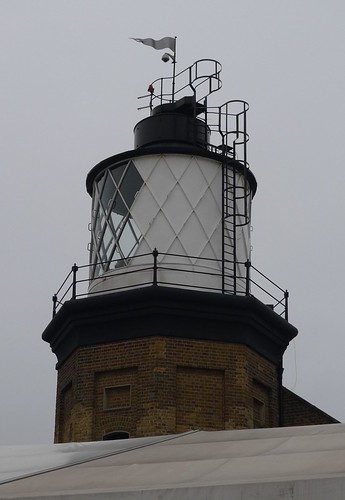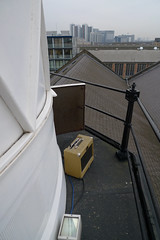Yesterday, I went to visit Longplayer, Jem Finer‘s thousand-year composition, for the eleventh anniversary of its first note, played on New Years Day, 1999. Longplayer is currently controlled (performed?) from Trinity Buoy Wharf in London’s simultaneously desolate and overbuilt Docklands, covered in newly built flats and offices, with hardly a human in sight.
Jem started out as a rock’n’roller, but has expanded into broader realms of visual and sonic art, as much interested in the logistics of producing sounds as the sounds themselves; I first got to know him in his role as the artist-in-residence in Oxford’s Astrophysics group where he drew maps, played music, and built — and lived in — a beautiful plywood-and-chicken-wire radio telescope.
Longplayer will take 1000 years to play, but music technology won’t be stable for that long a period (not to mention the sociology-political systems needed to arrange transmissions). Some of these questions have also been taken up by the Long Now Foundation, with which Longplayer has become affiliated. Jem has addressed some of these questions head-on over the last year with a series of Longplayer Live performances at London’s Roundhouse, and in San Francisco, as well as upcoming performances in LA, Tasmania and Porto. Although the main composition is streamed electronically, the live versions are performed on Tibetan singing bowls (which you can sponsor if you want to support the project). Jem has also transmuted the work into “Shortplayer” which uses the same algorithm and notation but is played on more conventional instruments.
Longplayer is stationed in a gorgeous lighthouse on the Thames. As you approach, it resonates with its extended, changing melody.

For the occasion, Jem provided drinks, bagels, and the opportunity to take in the view …

…and the music (this is apparently just a temporary amplifier as they recover from a power failure earlier in the year)…

(More pictures of Longplayer, Trinity Buoy Wharf, and environs here.)
Of course, the New Year is well-matched to the sort of long-term contemplation that Longplayer encourages. In the US and the rest of the so-called “New World”, the very idea of a thousand years is almost absurdly long — the imprint of humankind on the American continents was radically different in the year that the people there wouldn’t have called 1011. Here in Europe, not to mention Asia, much has changed technologically and politically since then, but the broad outlines of our presence would have been recognisable. But even here, the longest-lasting institutions, such as the Church, have undergone reformations and counter-reformations, sponsored states and wars between states, and certainly couldn’t be trusted to preserve a work of art for its own sake, despite the many things that have happily made their way down to us in 2011. Knowledge, of course, has proven easier to transmit than the works themselves; we can only hope that this remains true in the digital age and the rolling obsolescence of new technologies.
Longplayer is open to the public every weekend (aside from the celebratory drinks and bagels, I assume). And of course you can follow Longplayer on Twitter and, most importantly, listen to the stream anytime, anywhere.